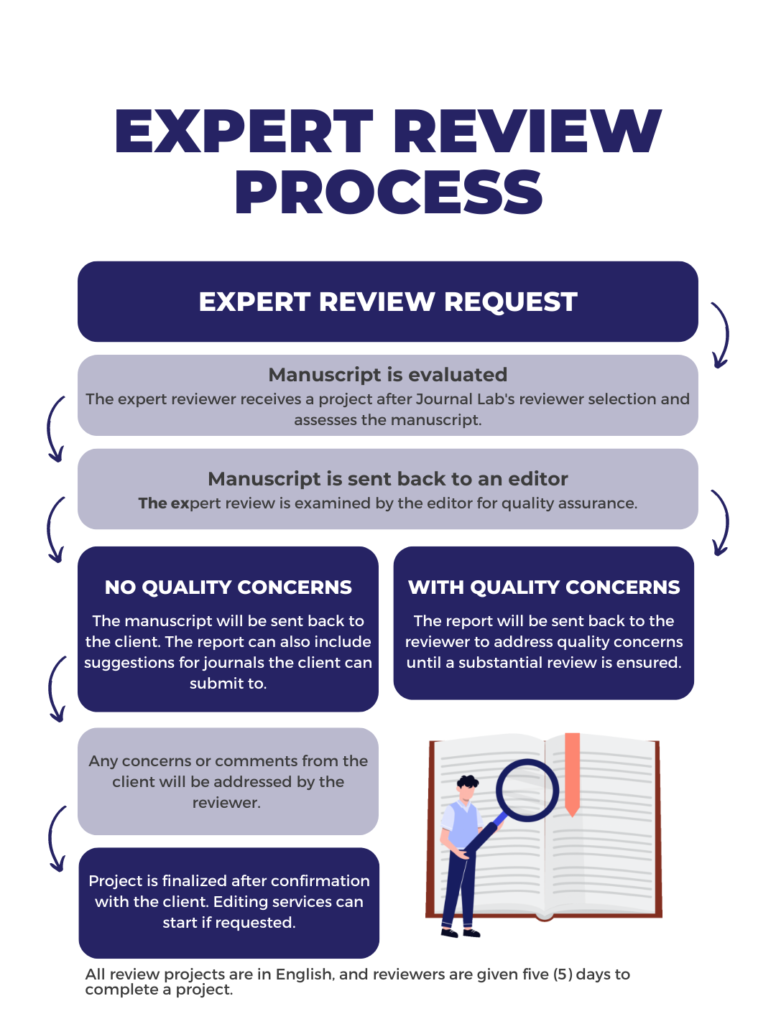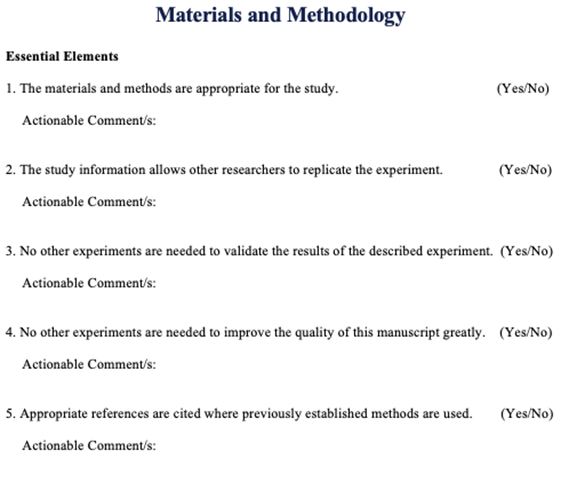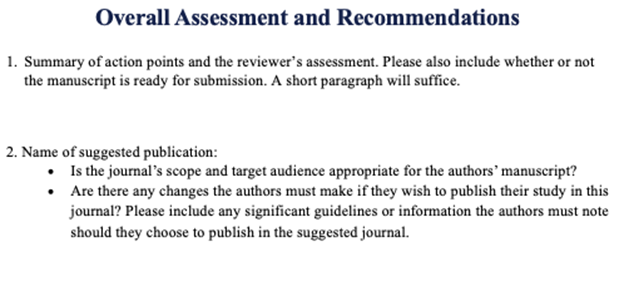You’ve made preparations, written your manuscript, and are now planning to submit it to a journal. Now, you’re probably wondering about the likelihood of your paper getting published. There’s no one way to confirm this, but getting other researchers to assess your paper before submission is a helpful step. This is called a “peer review.” A peer review can also be done after you submit your paper to a journal when your article gets assessed by the journal’s editorial board. Here at Journal Lab, we offer a simple and easy review process called the “Expert Review,” which is similar to a peer review in some ways but with its own differentiations.
Peer Review Process
A peer review is an evaluation and assessment of studies conducted by fellow experts in a specific field of study. This system ensures that any studies sent to journals and other publications are of quality by increasing the study’s credibility and the publication’s high-quality content, and peer reviewers play a key role in improving the quality of their fellow researchers’ manuscripts. However, the peer review process could be understood in two ways depending on when this system happens, and some considerations should be noted based on when the review is conducted. Briefly speaking, this process is an evaluation of your manuscript to ensure its overall quality, originality, significance, and validity—considerations that are expected of all published studies regardless of where they are published.
For instance, academic journals conduct peer reviews whenever they receive manuscripts from authors. During their evaluations, a peer review is conducted after a journal’s editorial board has confirmed a manuscript’s suitability for publication and whether it adheres to a preferred format. When going over the necessities for the peer review process, you should also know what the journal expects of your manuscript so you can make the necessary preparations. All journals operate with a certain type of review process, but these will differ between journals. Some prefer a single-blind process, while others operate with a double-blind review. Authors wouldn’t know who the reviewers are in the former, but the reviewers will know the names of the authors who wrote the study.
Conversely, both authors and reviewers will not know the others’ names in a double-blind process. As such, preparing a manuscript to cater to the journal’s preferences can help reduce the time needed for a journal to conduct its review. The changes to manuscript preparation usually focus on the authors’ information, so anything that could identify you should be removed or anonymized when preparing a manuscript for double-blind review. However, anonymizing the information is usually a good idea, as published studies are usually referred to from a third-person perspective. Once submitted to a journal, the journal’s editors will perform a preliminary review of the manuscript to ensure it adheres to the journal’s guidelines and format. If it does, it will simply proceed to the actual peer review step, where fellow experts in the relevant field will be asked to evaluate the paper’s content, methodology, ethics, relevance, and suitability.
At this point, the journal’s evaluation could go in one of three ways: acceptance and publication, return for revisions, or rejection. The first and last of these are straightforward, with the latter possibly being returned without any further information, likely because of its unsuitability to the journal’s aims and scope. It’s the second of the three possible outcomes that are most similar to a peer review process independently conducted by a journal, where reviewers go over each section of your manuscript and determine its suitability for publication based on the significance of your study, the presentation of your data, and the discussion of your findings. Keep in mind that even if a journal has a peer review process, you could also look into options for independent peer reviews. Reviewers will first identify if the important features of your manuscript are present, followed by comments about how to improve your manuscript and a general interpretation of your study’s shortcomings. Where necessary, reviewers may also offer some recommended studies that can help you revise your paper to ensure it is suitable for publication, especially if they have suggestions on where you could have your study published. Please note that peer reviews are only meant to provide suggestions and guidance to help you improve your manuscript; peer reviewers will neither write nor revise your paper, nor will they talk to a journal’s editorial board to publish your study. All manuscripts that go through a journal’s submission process will be subject to the same procedures, ensuring fairness.
So, What’s Expert Review?
Journal Lab’s Expert Review covers everything a normal peer review does while adding even more helpful information that can improve the authors’ chances of getting published in their target journal. For this service, Journal Lab selects and assigns a qualified expert reviewer to perform the assessment. The selection process depends on the manuscript’s subject category, topic, target journal, and specific requirements (Figure 1).

Figure 1. Journal Lab Expert Review Assignment and Delivery Process
Although peer reviews do provide suggestions on how to improve your paper, these comments are more often given without much detail—sometimes only talking about what needs to be changed or removed. With our Expert Review, the reviewers leave detailed feedback about your manuscript and even comments on specific parts of the paper, so authors would easily know what to do and where to do it (Figure 2). Each comment gives a clear justification and solution backed up by evidence and references, allowing authors to easily revise their manuscript as needed. A Journal Lab editor will also review the reviewer’s evaluation to ensure its substance, giving authors a better understanding of where and how their paper could be improved.

Figure 2. Example of specific Expert Review considerations when examining a manuscript
Journal Lab’s Expert Review is summed up in an easy-to-read Expert Reviewer Report, where comments are outlined and summarized to provide the key findings of the review process (Figure 3). Here, the strengths and weaknesses of your paper are highlighted, explained, and even supplemented, serving as a quick, easy-to-understand reference for authors. By objectively evaluating a manuscript based on data and evidence and diagnosing it technically, our reviewers can firmly establish the basis of the paper without any subjective judgment or inclination. Should it become necessary, and depending on the author, the overall assessment of a paper may also include a suggested journal where authors can publish their manuscript.

Figure 3. Example of an overall assessment section in an Expert Reviewer Report.
Despite the importance of this review process, some may still see this as an unnecessary and time-consuming step, especially if they want to publish their study as soon as possible. However, consider the peer review and Expert Review processes as a method of checking whether your study will be worthy of publication, especially if you don’t have much experience in submitting to journals. The process will confirm your study’s validity, including ensuring whether the proper methodologies and analytical techniques are used, and if there are any errors, you can correct them sooner. In addition, you may be able to proceed further into a journal’s evaluation after submission because your manuscript has already undergone a round of assessments from another reviewer. For language-related matters, you can use the reviewer’s evaluation to polish the way you explain your data and findings to make it easier for others to read and understand your content.
Moreover, a study with its data evaluated will be more robust, allowing it to consider possible criticisms from other reviewers when the journal evaluates its content. However, please understand that there may be areas where your study could improve, and a journal can still send your manuscript back and request some revisions from you if the reviewers contacted by the journal find possible points for you to revise. Consider it a favorable opportunity regardless of how you availed of a review for your manuscript: whether it be a peer review or our Expert Review. You receive feedback and suggestions for improvements, and you could use those to identify your options. If there is a possibility for publication in a journal, you can take that and see where the next round of revisions will go. Maybe you’ll even see your study published after the next round of reviews. If your study is rejected, you could consider why your manuscript was rejected, revise those errors, and try submitting it again to a different journal. You’re sure to have a higher chance of publication the next time around after revisions made following the feedback of your initial target journal.
Getting Advice When You Need It
If you’re finding it difficult to gauge the level of your research, have faced multiple rejections, would like to improve your research with a clear and fresh direction, or are in need of expert advice on your methodology, interpretation of your findings, and organization of your results, discussion, or other parts of your paper, then our Expert Review will help you in your journey to publication greatly. Our Expert Review also has room for reviewers to suggest studies that could reinforce your paper’s content where necessary.
Once you identified your research subject and wrote your paper, consider availing of Journal Lab’s Expert Review service. Journal Lab will tap into the expertise of various experts from a wide range of subjects, providing you with thorough and critical reviews to help you make the necessary changes to your manuscript, ensure that your studies are of international quality, and give you some tips on where to submit it to. Go to Journal Lab’s website for other services that can help you improve your manuscript.
👉 Check out our #writing tips: https://journallab.io/category/editing/


